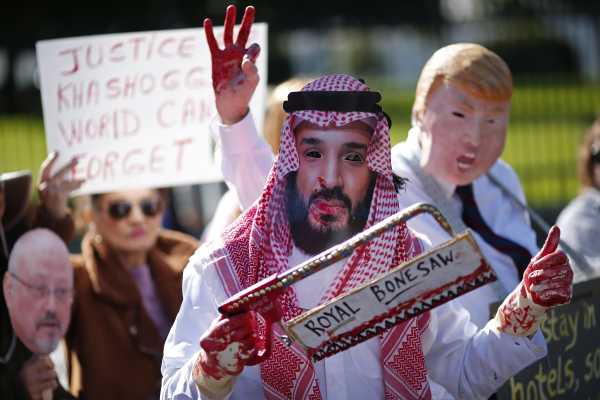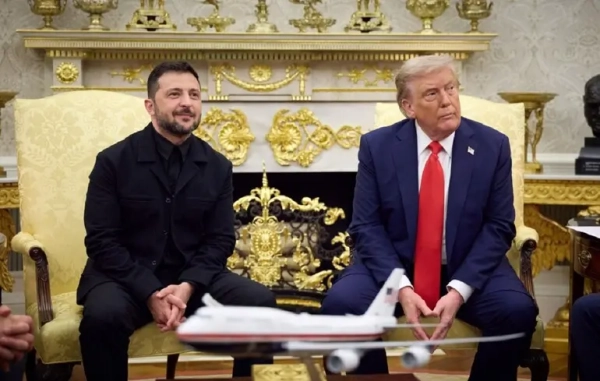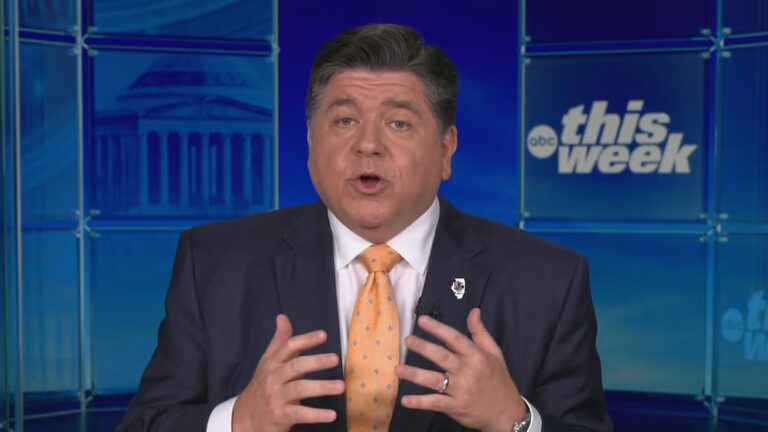
President Donald Trump must be giving thanks this morning for press coverage of his extraordinarily inappropriate statement on the murder of dissident and journalist Jamal Khashoggi.
Trump has secretive sources of income and murky financial ties to Saudi interests, and keeps touting entirely bogus statistics about the jobs impact of arms sales to Saudi Arabia. Nevertheless, much of the coverage of his statement simply takes at face value his assertions that his handling of this issue is driven by American interests — rather than by his own self-interest or the interests of his donors in the defense contracting industry.
For example, take two New York Times articles this morning: First, Mark Landler described the statement as “a stark distillation of the Trump worldview: remorselessly transactional, heedless of the facts, determined to put America’s interests first, and founded on a theory of moral equivalence.”
In a second news analysis, Mark Mazzetti and Ben Hubbard described Trump’s dismissal of “the very process of seeking the truth” while also characterizing Trump’s worldview as driven by the notion that “the decisions of a president should be guided by what is best for the economy and the United States’ security.”
A Washington Post story says Trump “puts economics above human rights,” and Stephen Collins at CNN accuses Trump of arguing that “principles that generations of Americans have cherished are for sale.”
What’s extraordinary about these articles is that several of them specifically call out the fact that Trump is routinely dishonest, only to then immediately assert that Trump is telling the truth about American interests and the American economy.
But he is not telling the truth! In fact, he says things that are untrue all the time, and the idea that the American people will reap economic gains from going soft on Saudi Arabia is one of those untrue things.
America has a strong interest in curtailing murder
It’s true that at times, foreign policy pits American values against concrete American interests. But in this particular case, it’s hard to think of a more concrete American interest than deterring foreign governments from murdering Americans.
Khashoggi was not a US citizen, it’s true, but he was a legal permanent resident of the United States and thus operating under the protective umbrella of the American government. In an ideal world, one would not only want foreign governments to avoid murdering American citizens, one would want them to steer very clear of anything that even remotely resembled murdering an American citizen.
Giving the okay to murder legal permanent residents of the United States is an invitation to push the envelope and get as close as possible to murdering American citizens.
Plus, three of Khashoggi’s children are American citizens. Beyond the core interest in protecting American citizens from murder, the United States has a fairly strong interest in protecting American citizens from being orphaned.
Further exacerbating the egregiousness of the crime, the Saudis murdered Khashoggi on Turkish soil. The current regime in Turkey is, itself, not great, but the fact remains that Turkey is a NATO ally that the United States is treaty-bound to defend. Assassinating someone in the Saudi Embassy in Istanbul is not exactly the same as making war on Turkey. But just as we want foreign governments to not do anything remotely resembling murdering American citizens, we also should want them to steer very clear of anything remotely resembling invading our NATO allies.
Bottom line: The United States is the mightiest empire the world has ever known. Signing a treaty with us or being accepted as a legal permanent resident of our country ought to count for something in the world. Trump’s message is that it doesn’t — that foreigners can screw around with our people and our allies as much as they like as long as Trump doesn’t mind personally.
Trump’s line on the economy is nonsense
Counterposed against the American interest in protecting the physical lives and liberty of Americans are the supposed economic benefits of US arms sales to the Saudi government.
A good sign that Trump’s argument on this score doesn’t make sense is that he keeps making factually inaccurate assertions about it. In Tuesday’s statement, for example, he repeated an earlier reference to a nonexistent $450 billion deal he supposedly struck with the Saudi government.
In his October version of this fake deal, it was going to produce a million jobs. But as Alexia Fernández Campbell has written several times for Vox, Trump is massively overstating the jobs impact of Saudi arms sales. The entire US defense production industry employs fewer than 400,000 people, so there can’t possibly be a million jobs tied up specifically in Saudi-related production.
The Saudis’ main ongoing purchase of American defense equipment is that they need a steady supply of new bombs to conduct their war in Yemen, but the bomb-making industry employs just 7,666 workers — most of whom are making bombs for the American government.
But stepping back from the specific falsehoods, the entire idea that Saudi purchases of US-made defense equipment represent some kind of favor to the United States is nonsensical.
If you think about how this transaction works, what the Saudi regime gains from US arms exports is access to some of the world’s most advanced military technology — stuff that we would not sell to an unfriendly regime because it’s such good stuff.
In exchange, the United States gets … dollars.
Dollars are great (I like dollars!), but the American government makes dollars, and doesn’t need to go begging the Saudi government for dollars. The arms sales to Saudi Arabia equal profits for the companies that make the weapons. But from the standpoint of the American economy as a whole, they represent a cost to the United States, not a benefit — because the people and equipment employed could be building things for Americans to use instead. Confusion on this point is consistent with Trump’s overall theory of how trade works, but Trump’s theory of how trade works is absurd.
There’s something weird about Trump and the Saudis
The US-Saudi alliance is longstanding and multifaceted, but Trump has injected a unique personal angle into it in that he appears to derive personal financial benefits from the Saudi government.
“Saudi Arabia — and I get along great with all of them. They buy apartments from me,” Trump said at a 2015 rally in Alabama. ”They spend $40 million, $50 million. Am I supposed to dislike them? I like them very much.”
There’s nothing illegal about making money from rich Saudis. And as Max Fisher explained in his 2016 Vox feature on Saudi influence in American politics, there’s nothing all that unusual about political elites aligning their foreign policy views with Gulf money.
But what’s unique about Trump is the extent to which he is able to personally profit from the Saudi government while in office. This August, for example, the general manager of the Trump International Hotel in Manhattan was pleased to announce that after two straight years of decline, revenue grew 13 percent in the first quarter of 2018.
Why? Well, according to a letter he wrote that was obtained by the Post, “a last-minute visit to New York by the Crown Prince of Saudi Arabia” played a key role.
We happen to know about that because of hard work by the journalists who uncovered it. The letter also noted the curious fact that during this lucrative engagement, neither the crown prince nor any other members of the royal family actually stayed in the hotel, since it didn’t have suites as big as they wanted. Nevertheless, “due to our close industry relationships … we were able to accommodate many of the accompanying travelers.”
Maybe it was close industry relationships, or maybe it was a cash bribe paid by the leader of a foreign dictatorship to the president of the United States. Either way, it’s not something we found out about through Trump’s financial
And it’s not something we found out through a congressional investigation because congressional Republicans have stonewalled all efforts to figure out what’s going on with Trump’s money.
We happen to know this because a hotel general manager put this particular bit of news in writing and somehow it leaked to the Post.
And Trump’s credulity about the Saudis extends beyond the specifics of the Khashoggi situation. This morning, he credited them with falling oil prices, which, again, he construed as a favor they are doing for the United States.
In fact, as Bloomberg’s Javier Blas writes Wednesday, the main structural force bringing down oil prices is the United States of America, where technological improvements in the Permian Basin in West Texas have drilled more than 100,000 new wells, many of which “would turn a profit even with crude prices as low as $30 a barrel.”
Don’t accept Trump’s false dichotomy
Since Trump is very clearly betraying American values, it’s tempting to accept the notion that he is implementing a trade-off that advances American interests.
But “don’t murder our people” and “don’t use embassies located in allied countries as killing zones” are not airy values. They are interests too. The United States is a major global power, and Saudi Arabia is a midsize country at best. We have an interest in not being pushed around by our client state, and it’s ridiculous to accept the framing that us giving them access to advanced military technology is a favor they do for us.
The global economy has changed enormously since the 1980s, and the United States no longer relies on Saudi oil production to keep prices moderate; the American defense industry is not a major source of jobs, anyway.
Trump’s decision to continue arms sales is unquestionably beneficial to some Americans — primarily the owners and executives of defense contractors — and he appears to derive personal financial benefits from close ties to the Saudi government.
But that’s what’s at issue here. The average American derives no economic benefit whatsoever from arms sales to Saudi Arabia, and bears at least a minor cost from living in a world where foreign governments are getting the green light to murder American residents.
Sourse: vox.com






